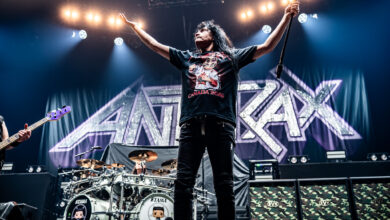More than 1.6 million people attended Metallica’s Moscow “Monsters of Rock” concert in 1991.
In 1991, Metallica’s performance at the “Monsters of Rock” festival in Moscow stands as a defining moment not only in the band’s career but also in the history of live music. This event was remarkable for its sheer scale, with over 1.6 million people in attendance, making it one of the largest rock concerts ever held. The festival, which also featured other notable heavy metal and hard rock acts, was part of a larger series of concerts that had already gained significant attention in the music world. However, the Moscow show was different; it was not just another stop on a tour, but a landmark event that resonated far beyond the music itself.
The concert took place during a time of tremendous change in Russia, as the country was transitioning from the Soviet era to a new political and social order. This period of transformation, marked by the collapse of the Soviet Union and the rise of new freedoms, provided a unique backdrop for the festival. For many Russians, the “Monsters of Rock” concert symbolized the arrival of Western culture and ideas, something that had been largely inaccessible during the Soviet years. Metallica, with their aggressive and rebellious style, embodied the spirit of change and freedom that many young Russians were eager to embrace.
The significance of this concert was further amplified by the fact that it was held in Moscow, the heart of the former Soviet Union. For decades, rock music had been largely suppressed or restricted in the Soviet bloc, with limited access to Western bands and their music. The “Monsters of Rock” festival represented a breaking down of those barriers, allowing Russian fans to experience live performances by some of the biggest names in rock and metal for the first time. Metallica, already a global phenomenon by 1991, was at the forefront of this cultural exchange, delivering a performance that would be remembered for years to come.
The atmosphere at the concert was electric, with a massive crowd that spanned as far as the eye could see. The sense of unity among the attendees was palpable, as fans from all over Russia came together to witness history in the making. Metallica’s setlist for the night included some of their most iconic songs, such as “Enter Sandman,” “Master of Puppets,” and “One.” Each song was met with overwhelming enthusiasm from the crowd, who sang along and cheered with a passion that reflected the significance of the moment.
For Metallica, this concert was a career-defining moment. The band, formed in Los Angeles in 1981 by drummer Lars Ulrich and guitarist/vocalist James Hetfield, had risen to fame with their distinctive blend of thrash metal and hard rock. By 1991, they were already established as one of the biggest bands in the world, with a string of successful albums and a reputation for powerful live performances. The Moscow concert solidified their status as global superstars and demonstrated their ability to connect with audiences on an unprecedented scale.
The logistical challenges of organizing a concert of this magnitude were immense. Ensuring the safety and security of over 1.6 million people required careful planning and coordination. The event was closely watched by authorities, who were wary of potential unrest in a country that was still navigating the uncertainties of its post-Soviet transition. Despite these concerns, the concert went off without major incidents, a testament to the organizers’ efforts and the discipline of the crowd.
The impact of Metallica’s performance in Moscow extended beyond the concert itself. It marked a turning point in the band’s career, as they continued to expand their reach and influence across the globe. The success of the “Monsters of Rock” festival in Moscow also paved the way for more Western artists to perform in Russia, opening the doors for a new era of cultural exchange and international music festivals.
In the years since the 1991 “Monsters of Rock” concert, the event has taken on a legendary status in the world of rock music. It is often cited as one of the greatest live performances in history and remains a highlight of Metallica’s career. The concert not only showcased the band’s musical talents but also underscored the power of music to transcend political and cultural boundaries, bringing people together in a shared experience of joy and liberation.
Today, Metallica continues to be one of the most influential bands in rock history, with a career spanning over four decades. Their ability to evolve and adapt to changing musical landscapes has kept them at the forefront of the industry. The 1991 Moscow concert remains a defining moment in their legacy, a symbol of their impact on global music culture and their role in shaping the sound and spirit of modern rock.





